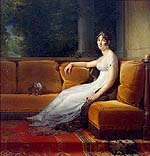Start - Welcome
- History
- Publications - Family Stories - Family Tree - Weblinks - Sitemap - Members Only
|
| Who was Joséphine de Beauharnais? | ||
 click on picture to enlarge |
Josephine was Napoleon's first wife. One year before getting married to the Empereur she travelled to Hamburg to meet the Banquiers MM. Matthiessen et Sillem
as documented in her estate. She stayed in the city from October
25th to 30th, 1795. The reason? A few hints from the biography cited
below make the guess easy. The future Empress lived a lavish life in
the Parisian society and suffered from a permanent lack of adequate
means. Why she undertook the cumbersome journey to Hamburg of all
places the prolific novelist Louise Mühlbach tells us in the chapter quoted below. The gentleman Joséphine was to meet was Conrad Matthiessen, son of the company's founder Hieronymus Matthiessen. Conrad's sister Marie Louise was married to Garlieb Helwig Sillem whom Hieronymus
had made a partner in his major company. At the time Joséphine
de Beauharnais visited the banking company Garlieb Helwig's son Hieronymus Sillem (also known as Jerôme) and Conrad Matthiessen
headed the company. While Hiernomyus was a full-blooded merchant and
banker Conrad devoted his time more to an interest in the arts and in
politics. Later he resigned from the partnership and spent his
later years as a benefactor in Paris.
|
|
| |
||
| Joséphine in Hamburg | ||
| From the novel "The Empress Josephine" by Louise Mühlbach (1814-1873) She first,
by the advice of M. Emery, undertook a journey to
M. Matthiessen met her wishes with a generous pleasure, and through him Josephine received sufficient sums of money to protect her from further embarrassments and anxieties, at least until her mother, who was on the eve of selling a portion of her plantation, could send her some money. On her return from her business-journey to (Source) |
||
| About Joséphine de Beauharnais (Wikipedia) |
||
 |
 |